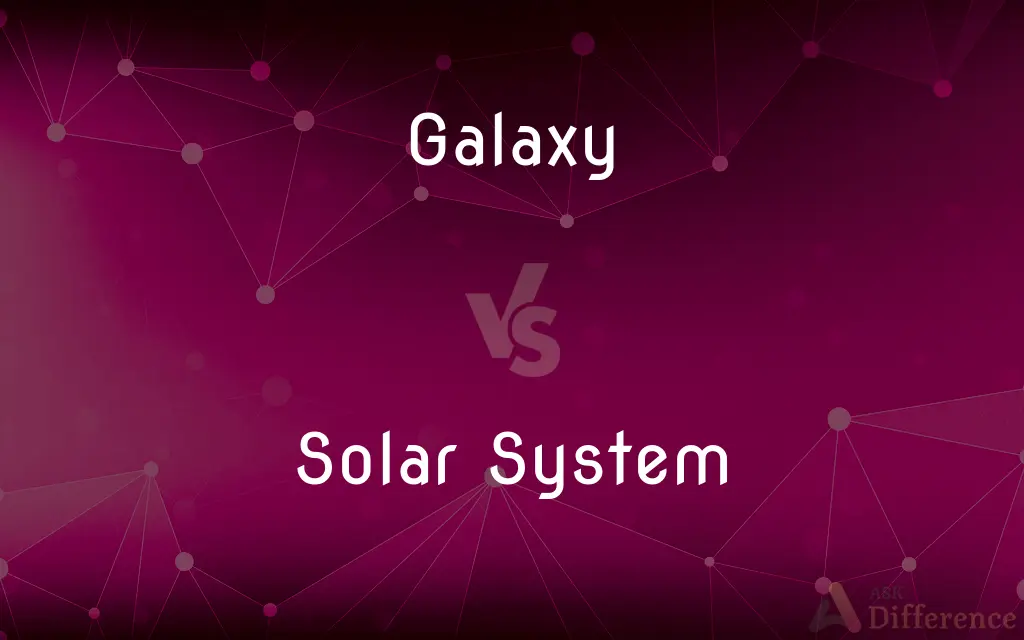Galaxy vs. Solar System — What's the Difference?
By Tayyaba Rehman — Published on November 27, 2023
A Galaxy is a vast collection of stars, gas, dust, and dark matter, bound by gravity. A Solar System consists of a star and the celestial objects gravitationally bound to it.

Difference Between Galaxy and Solar System
Table of Contents
ADVERTISEMENT
Key Differences
Galaxy is a colossal assembly of stars, dust, gas, and dark matter, interconnected by the forces of gravity. In contrast, a Solar System is a smaller arrangement of a star and its orbiting celestial bodies, such as planets, asteroids, and comets.
When we talk about a Galaxy, we often refer to the vast expanses containing billions of stars, like the Milky Way. On the other hand, when we mention our Solar System, we're specifically speaking about the Sun and its orbiting objects, including Earth.
Galaxies can contain multiple star systems, nebulae, black holes, and other astronomical phenomena. In contrast, a Solar System is specifically organized around its central star, with bodies in distinct orbits, defined by their gravitational relationship with the star.
The Milky Way, for instance, is a Galaxy that houses our Solar System among countless others. While the Solar System represents just a tiny fraction of the Milky Way, the Galaxy itself is merely one of billions in the observable universe.
In essence, a Galaxy is a broader, grander structure in the cosmos, encapsulating countless stars and their respective systems. Meanwhile, a Solar System offers a more intimate view of cosmic organization, highlighting the delicate dance of celestial objects around a star.
ADVERTISEMENT
Comparison Chart
Definition
Massive assembly of stars, dust, gas, and dark matter.
A star and its gravitationally bound celestial objects.
Scale
Encompasses billions of stars.
Typically includes one star.
Components
Stars, nebulae, black holes, dark matter.
Planets, moons, asteroids, comets.
Number
Billions in the observable universe.
Each galaxy can contain billions of them.
Example
Milky Way, Andromeda.
Our Sun and its orbiting celestial objects.
Compare with Definitions
Galaxy
A Galaxy is an immense space entity made up of stars and interstellar materials.
Scientists believe most galaxies harbor supermassive black holes at their centers.
Solar System
It's the gravitationally-bound system of a star and its orbiting bodies.
Within our Solar System, Venus is the hottest planet due to its thick atmosphere.
Galaxy
It's a vast celestial collection with a gravitational center, typically a black hole.
The rotation of a Galaxy can offer clues about its mass and composition.
Solar System
It describes the organization of celestial bodies around a central star.
The asteroid belt in our Solar System lies between the orbits of Mars and Jupiter.
Galaxy
Galaxies are the building blocks of the universe, grouped in clusters and superclusters.
When galaxies collide, they can form a new, larger Galaxy.
Solar System
A Solar System is a cosmic arrangement centered on a star.
While our Solar System has one star, others might have binary or multiple star systems.
Galaxy
Galaxies are the colossal cosmic structures containing billions of stars.
Observing the Andromeda Galaxy gives a glimpse into a neighboring star system.
Solar System
A Solar System is a star's family of orbiting celestial objects.
Our Solar System includes Earth, Mars, and Jupiter, among other bodies.
Galaxy
Any of numerous large-scale aggregates of stars, gas, and dust that constitute the universe, containing an average of 100 billion (1011) solar masses and ranging in diameter from 1,500 to 300,000 light-years.
Solar System
A Solar System encompasses a central star and its satellite entities.
Comets in our Solar System often have elongated orbits, bringing them closer and farther from the Sun.
Galaxy
Often Galaxy The Milky Way.
Galaxy
An assembly of brilliant, glamorous, or distinguished persons or things
A galaxy of theatrical performers.
Galaxy
The Milky Way; the apparent band of concentrated stars which appears in the night sky over earth.
Galaxy
(galaxy) Any of the collections of many millions or billions of stars, galactic dust, black holes, etc. existing as independent and coherent systems, of which there are billions in the known universe.
Galaxy
(figuratively) An assemblage of things or people seen as luminous or brilliant.
Galaxy
Any print or pattern reminiscent of a galaxy, generally consisting of blending, semiopaque patches of vibrant color on a dark background.
Galaxy
To furnish with galaxies.
Galaxy
(archaic) To gather together into a luminous whole.
Galaxy
The Milky Way, that luminous tract, or belt, which is seen at night stretching across the heavens, and which is composed of innumerable stars, so distant and blended as to be distinguishable only with the telescope.
Galaxy
A very large collection of stars comparable in size to the Milky Way system, held together by gravitational force and separated from other such star systems by large distances of mostly empty space. Galaxies vary widely in shape and size, the most common nearby galaxies being over 70,000 light years in diameter and separated from each other by even larger distances. The number of stars in one galaxy varies, and may extend into the hundreds of billions.
Galaxy
A splendid or impressive assemblage of persons or things; as, a galaxy of movie stars.
Galaxy
A splendid assemblage (especially of famous people)
Galaxy
Tufted evergreen perennial herb having spikes of tiny white flowers and glossy green round to heart-shaped leaves that become coppery to maroon or purplish in fall
Galaxy
(astronomy) a collection of star systems; any of the billions of systems each having many stars and nebulae and dust;
`extragalactic nebula' is a former name for `galaxy'
Galaxy
A Galaxy is a sprawling system of stars, dust, and gas held by gravity.
The Milky Way Galaxy is home to our Solar System.
Common Curiosities
What constitutes our Solar System?
Our Solar System consists of the Sun, eight planets, their moons, and various small bodies like asteroids and comets.
What's the primary difference between a Galaxy and a Solar System?
A Galaxy contains billions of stars, while a Solar System is based around a single star and its orbiting bodies.
How many galaxies are there in the universe?
There are estimated to be over two trillion galaxies in the observable universe.
What's the center of a Galaxy?
Many galaxies, including our Milky Way, have supermassive black holes at their centers.
What keeps the Solar System together?
The gravitational pull of the Sun primarily holds the Solar System together.
Can galaxies merge?
Yes, galaxies can collide and merge over cosmic timescales.
What's the largest galaxy known?
IC 1101 is one of the largest known galaxies, many times larger than the Milky Way.
Can a Galaxy have multiple solar systems?
Yes, a Galaxy like the Milky Way contains billions of individual solar systems.
How is the Solar System formed?
A Solar System forms from a collapsing cloud of gas and dust, leading to the birth of a star and its surrounding celestial bodies.
Can a Solar System have more than one star?
Yes, there are binary and even trinary star systems with multiple stars.
How many planets are there in our Solar System?
There are eight recognized planets in our Solar System.
Where is our Solar System located in the Milky Way?
Our Solar System is located in the Orion Arm of the Milky Way.
How old is our Solar System?
Our Solar System is about 4.6 billion years old.
What determines the shape of a Galaxy?
A combination of initial conditions, gravitational interactions, and mergers can determine a Galaxy's shape.
Are there other solar systems like ours in the Galaxy?
Yes, there are likely many solar systems with similarities to ours in the Galaxy, but each has its unique characteristics.
Share Your Discovery

Previous Comparison
Twin Room vs. Double Room
Next Comparison
Fiberglass Insulation vs. Spray Foam InsulationAuthor Spotlight
Written by
Tayyaba RehmanTayyaba Rehman is a distinguished writer, currently serving as a primary contributor to askdifference.com. As a researcher in semantics and etymology, Tayyaba's passion for the complexity of languages and their distinctions has found a perfect home on the platform. Tayyaba delves into the intricacies of language, distinguishing between commonly confused words and phrases, thereby providing clarity for readers worldwide.













































